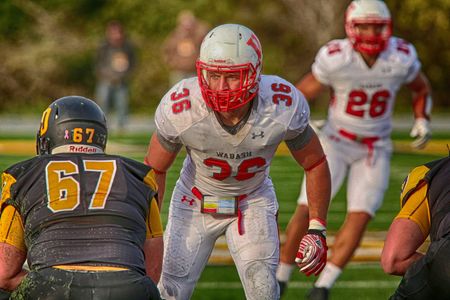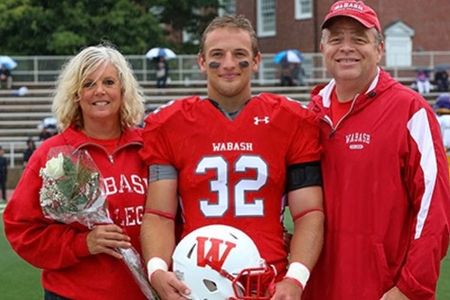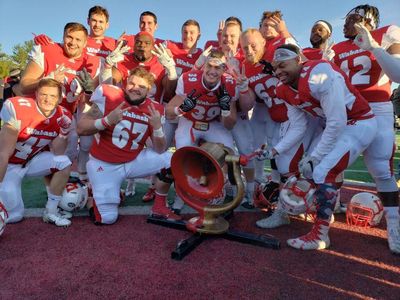Evan Hansen
 Evan Hansen played a variety of sports, was the captain of his football team, and is remembered by those who knew him as easy-going, hard-working, and happy.
Evan Hansen played a variety of sports, was the captain of his football team, and is remembered by those who knew him as easy-going, hard-working, and happy.
During his life, he suspected he may have CTE and his family donated his brain to the BU CTE Center, where he was diagnosed with CTE Stage I. We thank the Hansen family for their generous donation and commitment to our research.
Read Evan’s story below.
 Playing sports was a big part of Evan Hansen’s life. He started playing football in the third grade and continued for the next fourteen years through college, where he was the captain of his team. Growing up, he also played baseball, basketball, wrestling, and soccer.
Playing sports was a big part of Evan Hansen’s life. He started playing football in the third grade and continued for the next fourteen years through college, where he was the captain of his team. Growing up, he also played baseball, basketball, wrestling, and soccer.
At the time of his passing, Evan was a senior at Wabash College and he had plans to work in the medical field, either as a nurse or physician’s assistant.
During the last year of his life, Evan was being treated for depression and his family noted that he was more impulsive during that time. His parents, Chuck and Mary, said they thought there may be a link between the head impacts he had sustained and his emotional and mental health symptoms. At the time, they hadn’t heard of CTE.
 “Evan’s life was full of promise. He was easy-going, hard-working, happy, and admired by many. He was about to graduate college, he was captain of the football team, and he had countless friends, so it made little sense for him to suddenly start suffering emotionally,” they said. “But we now know that his depression resulted from physical damage to his brain resulting from many years of RHIs.”
“Evan’s life was full of promise. He was easy-going, hard-working, happy, and admired by many. He was about to graduate college, he was captain of the football team, and he had countless friends, so it made little sense for him to suddenly start suffering emotionally,” they said. “But we now know that his depression resulted from physical damage to his brain resulting from many years of RHIs.”
They believe now that Evan thought he had CTE but was unable to find resources to help himself. His death was widely known, and his parents and two brothers decided to donate his brain after receiving a call from Dr. Chris Nowinski, Co-Founder and CEO of the Concussion Legacy Foundation.
 They said receiving confirmation that Evan suffered from stage I CTE was helpful and note that it can be difficult to link concussions and repetitive head impacts to brain diseases since there can be a long delay between the cause and effect. “We now know that RHIs can cause a myriad of problems in the brain, some of which can be identified, and some that are still not fully understood,” they said. “So not every brain donor will get the CTE diagnosis confirmation, even if there is something damaged in their brains.”
They said receiving confirmation that Evan suffered from stage I CTE was helpful and note that it can be difficult to link concussions and repetitive head impacts to brain diseases since there can be a long delay between the cause and effect. “We now know that RHIs can cause a myriad of problems in the brain, some of which can be identified, and some that are still not fully understood,” they said. “So not every brain donor will get the CTE diagnosis confirmation, even if there is something damaged in their brains.”
They emphasize the importance of CTE research and how there is still more to understand, including the mechanisms of CTE, diagnosis, treatment, and prevention. “People do not understand the true risk of RHIs, and the absolutely horrible outcomes that can result.”
 Since Evan’s passing, his family has hosted five annual golf tournaments to raise money to remember his legacy. They have now raised over a quarter-of-a-million dollars.
Since Evan’s passing, his family has hosted five annual golf tournaments to raise money to remember his legacy. They have now raised over a quarter-of-a-million dollars.
The Hansen family recognizes there are many positive outcomes from playing sports, but stresses that children and their developing brains are susceptible to concussions and repetitive head impacts.
They have advice to keep young children safe: try to minimize the number of RHIs by choosing the proper sports, limiting the number of years of participation, changing practice techniques, and/or modifying game rules.
“Sports should be a benefit to children,” they said. “And not something that burdens them with preventable brain diseases later in life.”
 Evan’s diagnosis was made by Dr. Russ Huber at the BU CTE Center. If you would like to support the BU CTE Center and help fund the research that makes these diagnoses possible, you can donate here.
Evan’s diagnosis was made by Dr. Russ Huber at the BU CTE Center. If you would like to support the BU CTE Center and help fund the research that makes these diagnoses possible, you can donate here.
If you or a loved one are interested in brain donation, please view our Frequently Asked Questions (FAQs) and brain donation brochures for more information.
You can visit our Resources page to find resources for anyone struggling with suspected CTE symptoms.
This story was written by Amanda V. Cabral at the BU CTE Center. If you are interested in having a donor story written for your loved one, please reach out to her at avcabral@bu.edu.